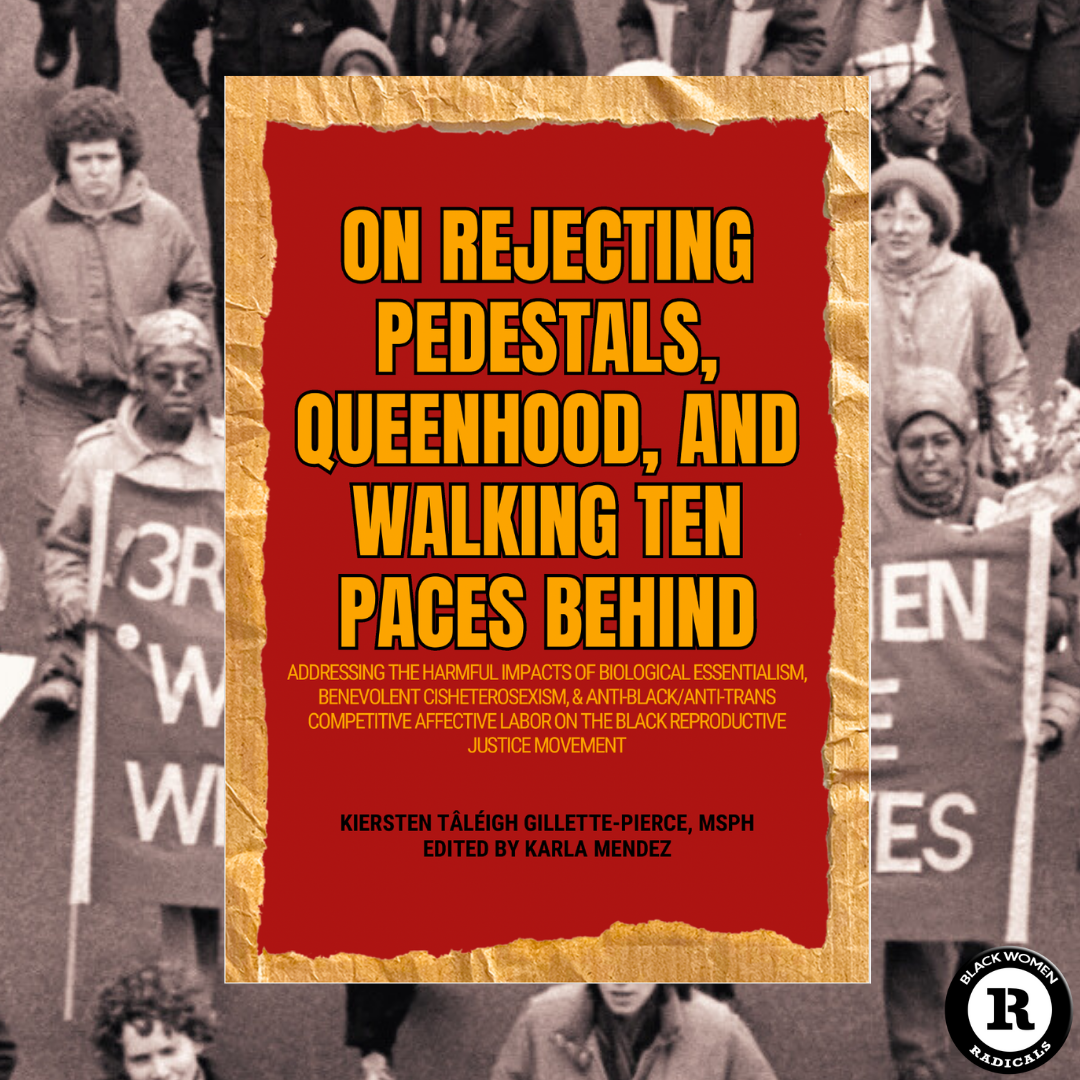On Rejecting Pedestals, Queenhood, and Walking Ten Paces Behind: A Radical Pamphlet
L-R: Barbara Smith, Enoch Page, members of the Combahee River Collective, Loretta J. Ross, and Dora Silva Santana.
By Kiersten TâLéigh Gillette-Pierce, MSPH
For the latest installment of our Special Blog Issue, “50 Years of Combahee”, organizer Kiersten TâLéigh Gillette-Pierce examines the harmful impacts of biological essentialism, benevolent cisheterosexsim, and anti-Black and anti-Trans affective labor in the Black Reproductive Justice Movement in a radical pamphlet.
In 1977, the Combahee River Collective promulgated a collective politic that was "actively committed to struggling against racial, sexual, hetrosexual, and class oppression" towards an "integrated analysis and practice" Today, Black trans/feminists, such as Marquis Bey, build upon the work of Black feminist pioneers who interrogated the usefulness of the category "woman," urging us to evaluate the limitations of the gender binary and explore how Black cisgender women have always operated outside of womanhood, parenthood, or personhood as identified by the white patriarchate. Still, dependence upon the invented "woman" identity permeates Black feminist movements, and is particularly salient within Black reproductive justice spaces.
“Through multidisciplinary insights, I build the case for adaptation of a Black transfeminist praxis to facilitate a shift in focus towards our relationship to power and collective sovereignty.”
As such, the fight for liberation is almost usurped by a strong devotion to "woman" and "mother/momma/mamma" identities, disenfranchising Black transmasculine and gender diverse individuals and their unique reproductive health concerns, vilifying Black transwomen with replacement theory-esque vitriol, and ultimately, functioning in service of the State while bolstering the legitimacy of the anti-Black cisheteronormative social order. In this essay, via historically and culturally-informed analysis, I reason that an unyielding fidelity to State-constructed identities in Black reproductive justice organizing not only stagnates movement progress, but also reinforces existing gender hierarchies, increases apathy towards reproductive injustices, and most poignantly, reduces engagement with collective action against the social system. Through multidisciplinary insights, I build the case for adaptation of a Black transfeminist praxis to facilitate a shift in focus towards our relationship to power and collective sovereignty.
Read the Radical Pamphlet
“On Rejecting Pedestals, Queenhood, and Walking Ten Paces Behind: Addressing the Harmful Impacts of Bioessentialism, Benevolent Cisheterosexism, and Anti-Black/Anti-Trans Competitive Affective Labor in the Black Reproductive Justice Movement”
By Kiersten TâLéigh Gillette-Pierce, MSPH
Please click the image below to access the pamphlet or you can access the pamphlet here.
About the author: Kiersten “Gillette” TâLéigh Ifákẹ́mi Ọláyínká Adéọlá Gillette-Pierce (she/they) is the Founder of In the Tradition of Our Ancestors. Viewing herself as a true servant to the people of the African Diaspora, she has worked and continues to work arduously to grow into her purpose as a healer. Gillette holds a master’s degree from the Bloomberg School of Public Health in Sexual and Reproductive Health and Maternal, Fetal, and Newborn Health. She also has a bachelor’s of science in Public Health and Women’s, Gender, and Sexualities Studies (WGSS) from American University. Gillette is currently working to complete the People’s Medicine School program to further their herbal medicine work; and, finishing up a blockchain management micro degree program at Gritnova Global Campus. Gillette is also a recipient of the 2023 40 Under 40 Public Health Catalyst Award from the Boston Congress of Public Health.
Having worked internationally in Togo, West Africa and Ethiopia, Gillette uses her knowledge, experiences, and connections to the people and land to build a sustainable bridge for Black folks in Africa, the West Indies, Latin America, Melanesia and the US to connect, collaborate, and liberate—as we are stronger together. Through their endeavors Gillette created ITOA to help start these transnational, inter-diasporic conversations, research, and knowledge-sharing. Her dream is that we will no longer see western medicine, economics, and humanitarian aid as our sole sources of advancement, but instead return to that which comes from us—the traditions of our ancestors. It is through this return that Gillette believes we will find true health, wealth and sustainability.

